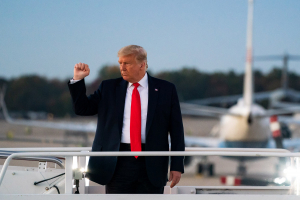Support migrant centric journalism today and donate

The US Supreme Court has dismissed an attempt made by Republican-led states to take over the legal defense of a hardline US immigration policy introduced by former US President, Donald Trump, which prohibited permanent residency for immigrants deemed likely to need US government benefits.
An unsigned, one-sentence ruling dismissed an appeal made by 13 Republican state attorney generals, led by Mark Brnovich – attorney general for Arizona, who sought to defend the public charge rule after the Biden administration refused to do so and went on to rescind it.
The rule implemented by Trump widened the scope of immigrants deemed likely to become a public charge and mostly dependent on government assistance. State attorney generals had hoped that the lower courts would throw out rulings that had sided with those who had challenged the rule, including several Democratic-led states.
New public charge rule
In February this year, a new public charge rule was proposed by the Biden administration, which officials described as ‘more fair and humane’. The new rule would avoid penalizing people for seeking medical attention and other services.
Trump’s version of the controversial US immigration rule came into effect in February 2020, but it was revoked by the Biden administration in March 2021 – acting on a decision in a separate legal case in Illinois that vacated the rule nationwide. Republicans had sought to intervene in March 2021 in an effort to revive Trump’s version of the rule.
Over the last 20 years, US government guidelines have stated that immigrants likely to become primarily dependent on direct cash assistance or long-term institutionalization – in a care home for example – at public expense would be denied US permanent residency, otherwise known as a green card.
Trump expanded policy
The public charge policy was expanded by Trump to include any person deemed likely to receive wider, non-cash benefits such as the Medicaid healthcare program, housing, food assistance and more, beyond a period of 12 months over any 36-month period.
In 2020, the US 9th Circuit Court of Appeal – based in San Francisco – ruled that Trump’s policy impermissibly expanded the definition of who counts as ‘public charge’ in violation of a federal law known as the Administrative Procedure Act. Other courts made similar rulings.
Brnovich sought to intervene in a challenge to Trump’s controversial US immigration rule involving three lawsuits – including two filed in California and Washington state by 18 mostly Democratic-led states and the District of Columbia.
Brnovich was joined by officials from Alabama, Arkansas, Indiana, Kansas, Louisiana, Mississippi, Missouri, Montana, Oklahoma, South Carolina, Texas and West Virginia.
Save states $1 billion annually
According to Republican officials, reviving Trump’s version of the US immigration public charge rule would save states more $1 billion annually by limiting the immigration of individuals who are not self-sufficient.
However, during the time that Trump’s version of the policy was enforced, the US government only issued five adverse decisions under it, according to court filings. It’s understood that all five decisions have since been reversed.
On March 3, 2022 the Supreme Court ruled that Kentucky’s Republican attorney general, Daniel Jay Cameron, could seek to restore a restrictive abortion law after the state’s Democratic governor dropped defense of the statutes when lower courts struck it down.
Workpermit.com can help with US employment-based visas
If you would like to apply for a US work visa – including L1 visas, E2 visas, O1 visas and H1B visas - Workpermit.com can help.
Workpermit.com is a specialist visa services firm with over thirty years of experience dealing with visa applications. We can help with a wide range of visa applications to your country of choice. Contact us for further details. You can also telephone 0344 991 9222.





















